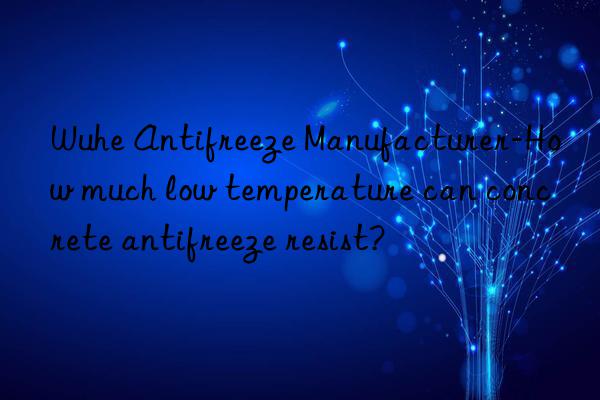
Contents of this article
How many degrees below zero can concrete with antifreeze be used?
How many degrees below zero can cement antifreeze resist?
What is the minimum allowable temperature for adding antifreeze to concrete during winter construction?
What is the minimum temperature resistance of cement plus antifreeze?
How many degrees below zero can concrete plus antifreeze be used?
It is necessary to add antifreeze at minus 5 degrees Celsius.
Antifreeze concrete is a substance that hardens at negative temperatures, achieves expected performance under specified curing conditions, and prevents moisture in the material from freezing at low temperatures. Ensure the normal construction of concrete under negative temperature and reduce the freezing point in the concrete mixture.
It can be combined with water-reducing agent, air-entraining agent, etc. for anti-freezing effect. Used for various concrete projects and during construction in cold seasons. Allow the concrete to hydrate normally in a negative temperature environment of 0°C to -15°C; lower the freezing point and improve the early strength of the concrete.
According to the building materials industry standard JC 475-2004 (replacing JC/T475-1992) antifreeze is defined as: it can harden concrete at negative temperatures and achieve expected performance and sufficient antifreeze strength under specified curing conditions. of admixtures. It is a substance that can prevent moisture in materials from freezing at low temperatures.
How many degrees below zero can cement antifreeze resist?
The temperature that concrete plus antifreeze can withstand is generally about minus 15 degrees Celsius. Antifreeze is an admixture that can harden concrete at negative temperatures and achieve expected performance and sufficient antifreeze strength under specified curing conditions. It is a substance that can prevent moisture in materials from freezing at low temperatures.
Adding antifreeze to concrete can ensure the hydration of cement, ensure normal construction of concrete at negative temperatures, lower the freezing point, and improve the early strength of concrete. It can be combined with water-reducing agent, air-entraining agent, etc. to achieve better antifreeze effect. Used for various concrete projects and during construction in cold seasons.
What is the minimum allowable temperature for adding antifreeze to concrete during winter construction?
As long as the temperature reaches below 0 degrees, we must add a certain amount of antifreeze when using concrete. Concrete with antifreeze can withstand a minimum temperature of minus 15 degrees.
In the cold winter, concrete pouring has become a headache for the construction team. If the temperature is too low, the solidification speed of concrete will be greatly reduced, and the poured concrete floor will often freeze and crack.
So concrete antifreeze has become an indispensable tool for pouring concrete in winter. However, concrete with antifreeze still needs to be kept warm. We can cover the poured concrete floor with a layer of plastic film.
What is the minimum temperature that cement plus antifreeze can withstand?
The temperature that concrete with antifreeze can withstand is -15℃. Antifreeze function: Makes concrete hydrate normally in a negative temperature environment of 0°C to -15°C; lowers the freezing point and improves the early strength of concrete. Antifreeze concrete is a substance that hardens at negative temperatures and achieves expected performance under prescribed curing conditions and prevents moisture in the material from freezing at low temperatures. Ensure the normal construction of concrete under negative temperature and reduce the freezing point in the concrete mixture. It can be combined with water-reducing agent, air-entraining agent, etc. to achieve better antifreeze effect. Used for various concrete projects and during construction in cold seasons. </p

 微信扫一扫打赏
微信扫一扫打赏

